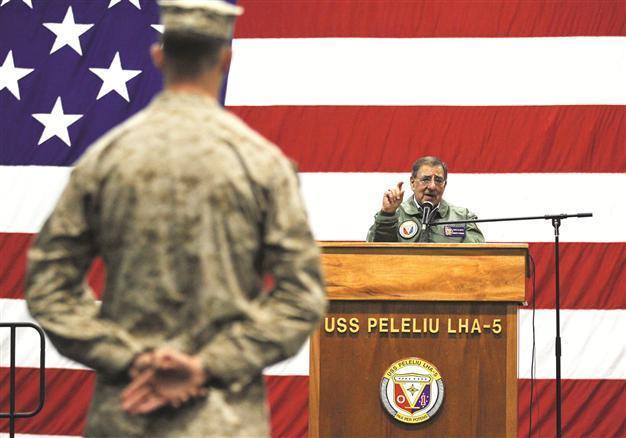US closely watches nuclear moves of Iran
WASHINGTON / JERUSALEM

US Secretary of Defense Leon Panetta answers a question from a US Marine during a visit to the USS Peleliu off the coast of San Diego. REUTERS photo
The military option against Iran is available if needed, U.S. Secretary of Defense Leon Panetta said on May 27, the same day that Iran announced it was planning to build a new nuclear plant and only days after crucial Baghdad talks.“The fundamental premise is that neither the United States nor the international community is going to allow Iran to develop a nuclear weapon. We will do everything we can to prevent them from developing a weapon,” Panetta told ABC News in an interview. He also expressed his hopes that the nuclear standoff with Iran could be solved peacefully. His comments came as Iran said it would build a new nuclear power plant, alongside its sole existing one in the southern city of Bushehr, by early 2014. Tehran’s announcement for the new plant came just two days after Baghdad talks between Iran and P5+1 – the United States, Russia, China, Britain, France and Germany –, which focused on Islamic Republic’s disputed nuclear programme. At the end of the summit, Iran and the world powers agreed to continue their talks in Moscow on June 18 and 19. Iran’s top nuclear chief Saeed Jalili said on May 27 that the talks had helped to adjust the stance of world powers toward the country’s nuclear program.
‘Gaps exist between US and Israel’
When asked if the Defense Department had plans in place to support or carry out a military strike against Iran, Panetta replied that the Pentagon would be ready if the White House made that call. “One of the things that we do at the Defense Department is plan. And we have plans to be able to implement any contingency we have to in order to defend ourselves,” Panetta said.
Meanwhile, Israeli officials said yesterday that there were gaps between Israel and the United States over negotiations with Iran, as opposed to previous announcements made by the U.S administration. A senior Israeli official stated that while there was no disagreement that Iran was a threat to world peace and should be prevented from obtaining a nuclear weapon, there was a gap over the non-satisfactory demands made by world powers in the Baghdad talks, which do not answer Israel’s minimum requirements that it believes should be placed before the Iranians, daily Haaretz reported. On May 25, a U.S. official said there were no gaps between the U.S. and Israel in anything related to talks between Iran and the six world powers over the future of Iran’s nuclear program.
















